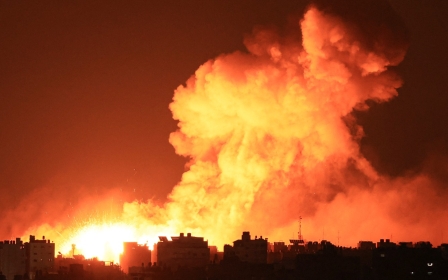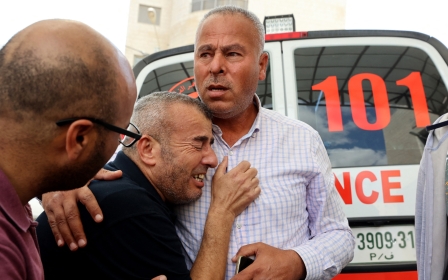Israel-Palestine war: Palestinians refuse to leave north Gaza after Israel orders forcible transfer

Palestinians are refusing to leave their homes after Israel's military on Friday ordered all civilians in northern Gaza, more than 1 million people, to evacuate to the south of the besieged enclave within 24 hours.
The Israeli army said in a statement on Friday that civilians must leave Gaza City in the north, and that they would not be allowed to return "until we say so" and until "a statement is issued allowing this".
"Civilians of Gaza City, evacuate south for your own safety and the safety of your families and distance yourself from Hamas terrorists who are using you as human shields," the military said.
"Hamas terrorists are hiding in Gaza City inside tunnels underneath houses and inside buildings populated with innocent Gazan civilians."
But many people are refusing to leave their homes, fearing a repeat of the Nakba in 1948, when hundreds of thousands of Palestinians were expelled from their land, and remain refugees over seven decades later.
Salim Ayoub, a 65-year-old from Gaza, told Middle East Eye that “what is happening now is a repeat of what happened in 1948.
“I sat down and discussed this with my children, and we have decided not to leave. We will not be leaving north Gaza and going to the south because we do not want to be made homeless again,” he added.
Naama Hazem, 20, lives with her family in the Daraj neighbourhood in Gaza City.
“We are more than 20 people in the building. My grandfather refuses to go out and says he prefers to die in his house,” she told MEE.
“We made the decision not to separate, even if it means we die together. In fact, even if we thought about leaving, there would be nowhere for us to go. We have no relatives in the south.”
Follow Middle East Eye's live coverage for the latest on the Israel-Palestine war
Palestinians from the north of Gaza have already been displaced in recent days by Israel's bombing campaign.
MEE’s correspondent Maha Hussaini has already left her home in the north following the orders of forced removal.
Another MEE reporter on the ground said that it currently "looks like a second Nakba" and that "many families are now leaving their homes".
The United Nations called on Israel to call off the evacuation order.
"The United Nations considers it impossible for such a movement to take place without devastating humanitarian consequences," said Stephane Dujarric, spokesperson for the UN secretary-general.
“The United Nations strongly appeals for any such order, if confirmed, to be rescinded, avoiding what could transform what is already a tragedy into a calamitous situation.”
The World Health Organization has said that Israel forcing severely ill people in Gaza, including those on life support, to move amounts to a “death sentence”.
A UN Security Council meeting on the Israel-Palestine war has been called for Friday.
'Second Nakba'
Hamas launched a surprise multi-front assault on Israeli communities on Saturday, firing thousands of rockets and sending fighters into Israel across land, air and sea. More than 1,300 Israelis have been killed, and around 130 people taken captive back to Gaza.
Israeli forces have responded by raining down a barrage of air strikes on the Gaza Strip this week, killing at least 1,500 people, most of them women and children.
The forced evacuation calls come as Israel amassed tanks near the boundary with Gaza ahead of an expected ground invasion of the enclave - the first such incursion in over nine years.
There is a belief among Palestinians that the order is part of a plan to move its residents southwards, until they are forced to leave Gaza altogether and cross into Egypt as refugees.
On Thursday, Palestinians from Gaza told MEE that plans to open a human corridor for civilians to flee to Egypt's Sinai region would be akin to a "second Nakba".
More than 700,000 Palestinians were sent into exile in 1948 and they and their descendants have never been allowed back.
Many of those Palestinian families ended up in Gaza and the current order to leave will bring back historic memories of the ethnic cleansing of 1948.
More than 60 percent of Gaza residents are already refugees from other parts of Palestine.
“I do not support the idea of there being resettlement in Sinai,” Ali Abdel-Wahab, a data analyst and researcher who lives in besieged Gaza, told MEE.
“The Palestinians who lived through wars and memories of the Nakba hope that it will not be repeated again.”
Middle East Eye propose une couverture et une analyse indépendantes et incomparables du Moyen-Orient, de l’Afrique du Nord et d’autres régions du monde. Pour en savoir plus sur la reprise de ce contenu et les frais qui s’appliquent, veuillez remplir ce formulaire [en anglais]. Pour en savoir plus sur MEE, cliquez ici [en anglais].




